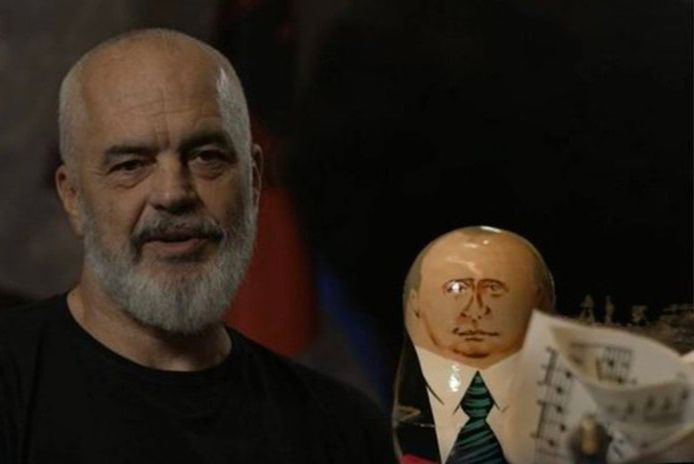
At a time when Europe faces some of its greatest geopolitical challenges in recent history and Vladimir Putin has become the embodiment of global threat, Albanian Prime Minister Edi Rama has chosen to display a doll of the Russian leader on his desk—a prop used as a punchline. But is this simply an ironic gesture or a troubling sign of deeper arrogance and a lack of seriousness in his role?
In a recent “prime time” interview on Italian television, journalist Federico Markoni didn’t shy away from provocative questions. While discussing rumors of a supposed secret meeting between Rama and Italian Prime Minister Giorgia Meloni, one peculiar detail caught the journalist’s eye: the Putin doll sitting prominently on Rama’s desk. When asked about this unusual choice, Rama’s response raised more eyebrows than smiles: “I like to see him as a doll. Having the ability to be self-ironic… is important to avoid being a slave to history.”
But can irony really serve as a valid excuse to trivialize a dictator like Putin—a man who has destabilized the world and continues to drive conflict and suffering across Europe? For a leader who claims to play a significant role on the international stage, this attitude crosses the boundaries of political decorum and enters the realm of megalomania.
Rather than using his position to send a serious message, Rama chooses to project himself as a “cool” leader, wielding a sense of dark humor. Yet, this humor feels jarring in a world confronting the very real consequences of Putin’s actions.
More than an act of self-irony, this gesture sparks discomfort. Is this the kind of leader who should represent a small but strategically important country like Albania on the global stage? A leader who plays with dolls while the world burns? This reflects a personality that views itself above history, attempting to control it through small symbolic gestures, while failing to grasp the weight of the reality around them.
Ultimately, it’s not just the Putin doll that’s the problem—it’s the message it conveys. When a prime minister mocks a figure who has destabilized Europe, is he also mocking his own people? Can we trust a leader who engages in such flippant irony in the face of significant global threats?
In a world where seriousness and principled leadership are more critical than ever, perhaps it’s time for Rama to reconsider his priorities. The stage demands realpolitik, not props, and the moment calls for gravitas, not gimmicks.
